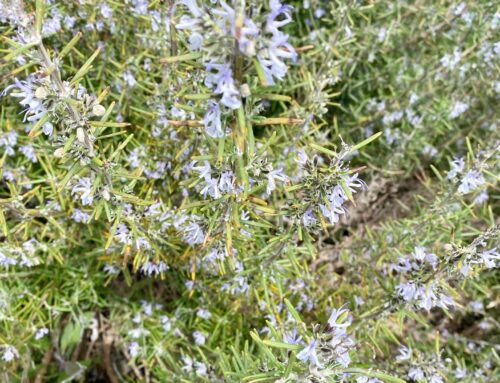
The lush grasses of summer will add amazing and unique flavor to our beef, transforming the nutrients of our Shenandoah Valley soil into a culinary masterpiece.
For decades our friends the Plancks, owners of Wheatland Vegetable Farms, hosted an annual “talent show” each summer. Acts varied from violin recitals to a cappella trios to skits both sublime and bombastic. In this motley tradition, several years ago my apprentice Thomas Unsworth and I decided to come up with a list of ‘Rejected T-Shirt Slogans for Smith Meadows,’ sort of a David Letterman-esque top ten of silly sayings that should never appear on our farm t-shirts. We said them out loud to each other as we drove home from famers market one afternoon, making them up on the spot.
It all started out appropriately low-brow, and very pun intensive. “We’re out standing in our field,” one of us would say, while the other would suggest, “Just moo it.” Ideas would sometimes serve as springboards for one another. “Smith Meadows, where the stakes are high, but the steaks are reasonably priced,” would be followed with, “Smith Meadows: Egg-ceding your wildest Egg-spectations.”
Other phrases would momentarily soar, only to quickly fizzle out. “Raised, grazed, and… and…” I offered, searching in vain for the perfect trifecta. “Non-maized? Unfazed? Mayonnaised?” I shook my head, at a loss. Moments later, Thomas posited the auspicious but ultimately doomed “pork chops, lamb chops, karate chops…!” His words trailed off, until an awkward, silly silence hung between us. It was an ironic necessity, but in the spirit of the Planck’s venerable talent show, we wanted our ‘bad’ list to be as excellent as possible.
Of course, due to the unavoidable realities of the livestock business, many of our thoughts eventually trended towards the grisly. “Work was murder today,” was followed in quick succession by: “Jolly good cows, bloody good burgers.” “Mary had a little lamb… would you like to try its kidneys?” and the groan worthiest one of all, “We stab it, you grab it.”

Vibrant spring pastures are an entirely different grazing experience from the mature grasses of summer or fall, and lend themselves to management considerations that can vary dramatically, even from one farm to another.
“It takes great ground to make ground this great,” I said, channeling some sort of inner Benjamin Franklin. A second later, another phrase popped into my head. “Not to boast, but we’ve got the most roast on the coast!”
Just like our burgers, I was on a roll.
“Wait a minute,” Thomas said. I was driving the market truck, and he had been jotting everything down. He paused his writing in mid-sentence. “What was that first one again?”
“Which one? ‘Smith Meadows, where ‘goat’ is a four letter word?’”
“No, after that. The one about ‘great ground’…”
“Oh. ‘It takes great ground to make ground this great’?”
“Yeah,” he nodded, silent for a few moments. “You know, come to think of it, that would make a really great t-shirt slogan. A real slogan, I mean.”
I didn’t think much more about it at the time, and after another round or two of witticisms, we had our list mostly complete. It wasn’t until I recently found the notes, almost three years later, that I gave the quote any real additional thought.
More than ever, I’m now convinced about the uniqueness of the soil on our farm, and the culinary magic that is transferred from our fertile pastures into the flavor of our meats. In the same way that great wines have a distinctive provenance, incorporating the specific attributes of the earth where the grapes were raised, I feel like something similar is happening here in our little corner of the Shenandoah Valley. A simple hamburger from beef raised on our farm, seasoned with nothing more than a sprinkle of sea salt and placed on a whole wheat bun, lends itself to a deliciousness that, to me, sometimes borders on the transcendental.

Despite a perfect frame and a lustrous, shiny coat, he's a perfect example of the difference between grass-fed and grass-finished. A few more months of rotational grazing will pack on the additional two hundred pounds of beef needed before he ends up at our local butcher shop.
The French have a word that encapsulates this phenomenon: terroir. Loosely translated, this is the incorporation of soil, weather conditions, and human artistry into the final product. In wine making, this human element might involve the specific time of day when the grapes are picked, or to what degree they might be blended with other varieties, or the type of wood selected for the casks. Wine making is famous for its coveted and nuanced vintner secrets, as is reflected by its legions of aficionados world wide.
Grass-fed beef that has been properly raised requires its own high levels of agricultural sophistication, with considerations that are often specific to the soil upon which the animal was raised. Stocking rates, inclement weather, stockpiled forages and perfectly timed pasture rotations are just a small handful of the daily management concerns we face in our quest to raise the best grass-fed beef around.
As is true with regards to wine making, there are undoubtedly certain aspects of grass-based farming that might be similar regardless of region, generalizations that might carry over from one farm to the next. However, consider raising grapes first in Oregon, then Argentina, then France. The differences between soils, climate, and varying degrees of human artistry will quickly become self evident. In our particular micro-climate and geologic profile, the challenges are no less daunting.
On our farm, everything we do starts with the soil first, then the grass, then the animals. Our priorities must go in that order, with no short cuts. Only after a steer or heifer has been properly fattened off the land (with no corn or soybean supplementation at all), can we then discuss the important topics of handling, transporting, processing, aging, packaging, etc. By focusing on soil fertility as our primary objective, it makes the human side of our job much more manageable. Without the alchemy of our incredible soils, this fertile and uniquely flavorful earth, the rest of the conversation becomes more or less moot.
Will a Smith Meadows grass-fed burger ever rival a flute of Dom Perignon in popularity? Some questions are unanswerable, but just like those famous, unique grapes, it all starts with the soil. Crummy t-shirt slogans aside, I’m a believer that it really does take great ground to make ground this great.

Winter pastures bring their own seasonal challenges, but a commitment to raising cattle entirely on grass means that we work with what nature provides. We think the reward for our efforts comes in the amazing taste of one of our fabulous burgers, with or without champagne.









Forrest! Just watched the movie, DIRT!, last night – and have been thinking about soils a lot. A winemaker in the film likes to taste his soils. Have you tried that?
This was a common practice when I was studying geology, too, to differentiate minerals such as halite (rock salt), or taste for traces of iron. There’s nothing quite like eating rocks. And I thought ‘True Grit’ was just a movie…
Forrest,
I think you must not forget the “personality” of the farmer working the land….raising the animals…and appreciating being blessed with the determination for being a good farmer. The farmer who does not really want to be a farmer grumbles his way through his or her work day, wishing they had chosen another profession , and making life “taste” bad, affecting the way the job does or doesn’t get done. The farmer who wants to be close to the land and connects to it, adds the right ingredients to every project he undertakes,no matter how grueling it may be. The grumpy, grumbling, “I don’t want to be here” farmer, makes the cows grumpy too. From the rows of spinach in the vegetable garden to the juicy organically grown double-bacon cheeseburger (with fresh garden onions, of course), the farmer who loves what he does can make everything taste good!!
Absolutely. I’ve witnessed this over and over again. For example, experienced cattlemen who come to our farm consistently remark about how calm and content our animals seem to be; this is in no small part a reflection of how we, the farmers, carry ourselves. Well said.
So, my question is, “Are there T-shirts available?”..or are you going to hold a Smith Meadows T-shirt slogan contest and award a weekend experience at the farm as the prize for the winning slogan. Maybe you already did this, and I missed it??
This is some great material. I loved reading this.
I am not at all surprised that a 4Her excels at a witty top ten list 😉